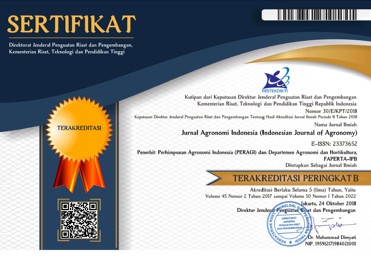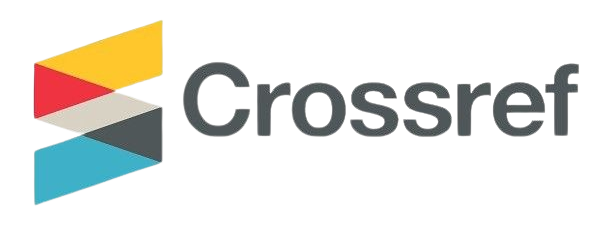In Vitro Shoot Formation on Sugarcane (Saccharum officinarum L.) Callus as Affected by Benzyladenine Concentrations
Abstract
In vitro regeneration of sugarcane (Saccharum officinarum L.) clones can support breeding program of sugarcane. This
research was conducted to study the effect of benzyladenine on in vitro shoot formation from sugarcane callus. Leafrolls were
cultured for 8 weeks on callus induction medium containing MS salts, 30 g L-1 sucrose, 150 ml L-1 coconut water, 100 mg L-1
myo-inositol, 0.1 mg L-1 thiamine-HCl, 0.5 mg L-1 pyridoxine-HCl, 0.5 mg L-1 nicotinic acid, 2 mg L-1 glycine, and 3 mg L-1
2,4-D. Callus was then subjected to different concentrations of benzyladenine (BA) (0, 0.5, 1, 2, and 2.5 mg L-1) contained
in MS media. The experiment showed that after 8 weeks in culture 2 and 2.5 mg L-1 BA led to the highest percentage of shoot
formation (100%). The experiment also showed that addition of BA caused an increase in percentage of shoot formation,
number of shoot per callus clumps, and average shoot length. In the range of 0-2.5 mg L-1, the higher the concentrations
of BA the more shoots and the longer shoots were produced. Highest number of shoots was recorded at BA 2.5 mg L-1
(36.4 shoots per callus clump) and highest average shoot length was obtained at 2 and 2.5 mg L-1 BA, i.e. 2.25 and 2.3 cm
respectively. The shoot formation system was then applied to 12 sugarcane genotypes, resulting in statistically different
response and producing substantial number of shoots, ranging from 29 to 41.33 shoots per clump.
Keywords: In vitro, sugarcane, leafrolls, benzyladenine, shoot formation












